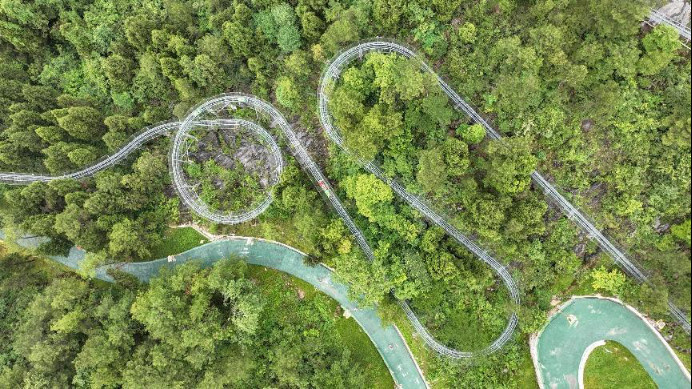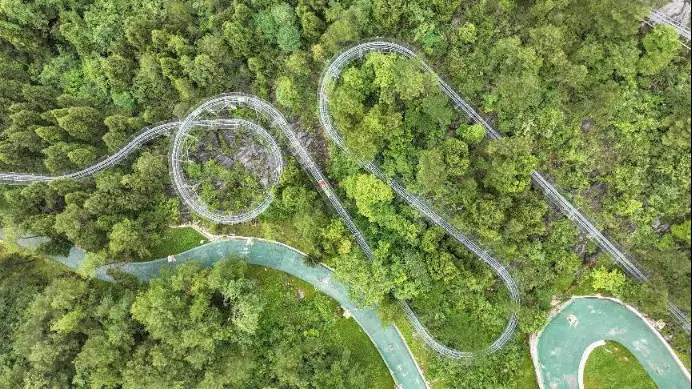By Ni Yi, People's Daily

Aerial photo taken on June 25, 2022 shows the Taohuayuan National Forest Park in southwest China's Chongqing municipality. (Photo by Qiu Hongbin/People's Daily Online)
It's been two years since the revised Forest Law took effect in China on July 1, 2020.
In the past two years, judiciary authorities have strictly abided by the principle stipulated by the law, which requires the country to prioritize ecology and protection and pursue sustainable development through a method that combines conservation and afforestation. As a result, a legal protection wall has been built and constantly consolidated for forest ecology.
In January this year, a case of destruction of ecological resources proposed by the Yuelu District People's Procuratorate in Changsha, central China's Hunan province came to trial, which involved illegal logging of 454.84 cubic meters of timber and serious damage to the local woodland.
According to law, the six criminals in the case were put into jail with sentences ranging from a year to three years and 11 months. Besides, they were ordered to pay over 104,000 yuan ($15,528) in total to compensate for ecological losses and apologize to the public on media outlets above the municipal level for civil public interest action.
It was the first case in Changsha in which the suspects were requested to compensate for the ecological damages they had caused in the whole process of the crime, including illegal felling, transporting and trading of trees.
The case mirrored the judiciary protection of forest ecology carried out by Chinese judiciary authorities with the strictest system and rule of law.
Since 2019, courts at all levels across China have concluded 403,989 cases of first instance related to forest resources, including 268,180 civil lawsuits.
On June 14 this year, the Supreme People's Court, China’s top court, released an interpretation on dealing with forest-related civil disputes, as well as 10 supporting model cases, to improve the system of rules applicable to environmental and ecological laws, and promote science-based protection and utilization of forest resources from the legal perspective.
In recent years, innovative compensation measures were emerging, such as alternative restoration and non-in-situ greening.
Procuratorates in southwest China's Guizhou province have introduced civil compensation to the evaluation system of criminal offenses, urging suspects and defendants to restore the ecological environment through afforestation efforts.
The people's court in Anji county, Huzhou, east China's Zhejiang province has dispatched 120 court officers to 215 villages and communities to ensure that compensation is made for every criminal case related to environmental resources.
The Intermediate People's Court of Chunlin district, Changchun, northeast China's Jilin province has signed 164 re-greening agreements since 2018, replanting 886.74 mu (59 hectares) of forests.
"The Forest Law stipulates an approach combining conservation and afforestation, so we should make innovations in the way we restore ecology based on particular forest environment, to ensure a science-based and timely recovery of the functions of the forest ecology," said Xie Deti, a professor with the College of Resources and Environment, Southwest University.
Upholding the concept of restorative justice, judiciary departments are guiding the perpetrators to turn from "destroyers" to "recovers" of the ecological environment, which synergizes the legal, social and ecological effects of the judicature, Xie said.
Over the past two years, the Forest Law has provided a legal basis for advancing ecological progress, protection, cultivation, and utilization of forest resources, said Wang Xiang, an official with the Legislative Affairs Commission of the National People's Congress Standing Committee, adding that the law is promoting coordinated eco-socio development and forest ecological protection.
To strive for carbon peak and carbon neutrality goals is an important measure for China to address acute resource and environmental constraints and achieve sustained development. Forest is the largest carbon pool in the terrestrial ecosystem. It bears important ecological functions such as carbon sequestration.
According to the interpretation released in June, perpetrators are allowed to compensate for the losses of forest resources by undertaking certified methods of forestry carbon sequestration. In practice, such cases have already been reported in Fujian, Guizhou and other regions of China.
"So far, China has incorporated forestry carbon sequestration into the emission trading system as a certified emission reduction project, and the country is building a national carbon emission trading market," said Lin Jinxing, a professor with Beijing Forestry University.
The measures taken by judiciary authorities in the recent years have constantly improved the trade rules of forestry carbon sequestration, consolidated the carbon sequestration capability of the forest ecology, increased the carbon sink of the forest ecosystem, and contributed to the sustainable development of the green, low-carbon and recyclable economy, the professor added.
In the past two years, judiciary authorities have strictly abided by the principle stipulated by the law, which requires the country to prioritize ecology and protection and pursue sustainable development through a method that combines conservation and afforestation. As a result, a legal protection wall has been built and constantly consolidated for forest ecology.
In January this year, a case of destruction of ecological resources proposed by the Yuelu District People's Procuratorate in Changsha, central China's Hunan province came to trial, which involved illegal logging of 454.84 cubic meters of timber and serious damage to the local woodland.
According to law, the six criminals in the case were put into jail with sentences ranging from a year to three years and 11 months. Besides, they were ordered to pay over 104,000 yuan ($15,528) in total to compensate for ecological losses and apologize to the public on media outlets above the municipal level for civil public interest action.
It was the first case in Changsha in which the suspects were requested to compensate for the ecological damages they had caused in the whole process of the crime, including illegal felling, transporting and trading of trees.
The case mirrored the judiciary protection of forest ecology carried out by Chinese judiciary authorities with the strictest system and rule of law.
Since 2019, courts at all levels across China have concluded 403,989 cases of first instance related to forest resources, including 268,180 civil lawsuits.
On June 14 this year, the Supreme People's Court, China’s top court, released an interpretation on dealing with forest-related civil disputes, as well as 10 supporting model cases, to improve the system of rules applicable to environmental and ecological laws, and promote science-based protection and utilization of forest resources from the legal perspective.
In recent years, innovative compensation measures were emerging, such as alternative restoration and non-in-situ greening.
Procuratorates in southwest China's Guizhou province have introduced civil compensation to the evaluation system of criminal offenses, urging suspects and defendants to restore the ecological environment through afforestation efforts.
The people's court in Anji county, Huzhou, east China's Zhejiang province has dispatched 120 court officers to 215 villages and communities to ensure that compensation is made for every criminal case related to environmental resources.
The Intermediate People's Court of Chunlin district, Changchun, northeast China's Jilin province has signed 164 re-greening agreements since 2018, replanting 886.74 mu (59 hectares) of forests.
"The Forest Law stipulates an approach combining conservation and afforestation, so we should make innovations in the way we restore ecology based on particular forest environment, to ensure a science-based and timely recovery of the functions of the forest ecology," said Xie Deti, a professor with the College of Resources and Environment, Southwest University.
Upholding the concept of restorative justice, judiciary departments are guiding the perpetrators to turn from "destroyers" to "recovers" of the ecological environment, which synergizes the legal, social and ecological effects of the judicature, Xie said.
Over the past two years, the Forest Law has provided a legal basis for advancing ecological progress, protection, cultivation, and utilization of forest resources, said Wang Xiang, an official with the Legislative Affairs Commission of the National People's Congress Standing Committee, adding that the law is promoting coordinated eco-socio development and forest ecological protection.
To strive for carbon peak and carbon neutrality goals is an important measure for China to address acute resource and environmental constraints and achieve sustained development. Forest is the largest carbon pool in the terrestrial ecosystem. It bears important ecological functions such as carbon sequestration.
According to the interpretation released in June, perpetrators are allowed to compensate for the losses of forest resources by undertaking certified methods of forestry carbon sequestration. In practice, such cases have already been reported in Fujian, Guizhou and other regions of China.
"So far, China has incorporated forestry carbon sequestration into the emission trading system as a certified emission reduction project, and the country is building a national carbon emission trading market," said Lin Jinxing, a professor with Beijing Forestry University.
The measures taken by judiciary authorities in the recent years have constantly improved the trade rules of forestry carbon sequestration, consolidated the carbon sequestration capability of the forest ecology, increased the carbon sink of the forest ecosystem, and contributed to the sustainable development of the green, low-carbon and recyclable economy, the professor added.
 Menu
Menu
 Forest Law builds legal protection for ecology
Forest Law builds legal protection for ecology
















